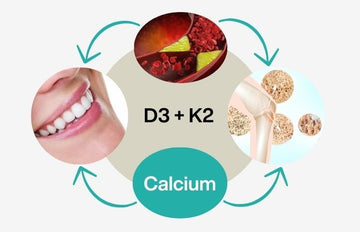Witaminy D3 i K2 pełnią kluczowe funkcje w organizmie indywidualnie. Ich współpraca jest jednak szczególnie istotna w kontekście zdrowia kości i profilaktyki chorób układu krążenia. Razem działają synergicznie, tworząc niezwykle skuteczne połączenie. Niektórzy sugerują nawet, że skuteczne leczenie przerzedzenia kości wymaga skojarzonego działania tych dwóch witamin. Dlatego podkreślamy znaczenie tego silnego duetu witamin: K2 i D3.
Artykuł w skrócie:
- Istotna rola witaminy D
- Rola form witaminy K w zdrowiu kości
- Badanie wzajemnego oddziaływania witaminy D3, K2 i wapnia
- Podwójna rola metabolizmu wapnia w zdrowiu kości i naczyń krwionośnych
- Czy niedobór wapnia można rozwiązać poprzez suplementację witaminy D3?
Istotna rola witaminy D
Witamina D jest niezbędnym składnikiem odżywczym i niezbędnym regulatorem metabolizmu wapnia (i fosforu) w organizmie. Ponadto odgrywa kluczową rolę we wspieraniu układu odpornościowego poprzez aktywację produkcji przeciwciał ochronnych przeciwko bakteriom i wirusom, a także reguluje zarówno wrodzoną, jak i nabytą odporność. Witamina D pomaga chronić przed różnymi infekcjami, chorobami układu oddechowego i chorobami przewlekłymi, a jej niedobór jest powiązany z chorobami autoimmunologicznymi.W przypadku witaminy K minęło dużo czasu, zanim badania wykazały istnienie różnych jej form, które należy klasyfikować jako odrębne składniki odżywcze. Metabolizm i funkcje witamin K1 i K2 w organizmie są zupełnie różne.
Rola form witaminy K w zdrowiu kości
Podczas gdy witamina K1 bierze udział w kaskadzie krzepnięcia krwi, witamina K2 znacząco wpływa na skład macierzy kostnej. Kieruje cząsteczki wapnia do kości, potencjalnie również do zębów, zapobiegając w ten sposób ich gromadzeniu się w nieodpowiednich miejscach w organizmie, takich jak naczynia krwionośne, nerki i inne tkanki miękkie, gdzie mogłyby z czasem powodować poważne problemy. Witamina K2 MK7 jest najskuteczniejszą formą witaminy K2 dla organizmu. Jest łatwo wchłaniana i, w porównaniu z innymi formami (np. MK4), utrzymuje się we krwi najdłużej.
Badanie wzajemnego oddziaływania witaminy D3, K2 i wapnia
Mówiąc wprost, dla zdrowych i mocnych kości potrzebna jest odpowiednia ilość wapnia. Jednak wapń nie jest skutecznie wchłaniany przez organizm bez obecności witaminy D3. Co więcej, aby wapń mógł skutecznie dotrzeć do kości i zębów, niezbędna jest witamina K2. Razem wspierają one zdrowie i siłę kości, będąc niezbędnymi składnikami w utrzymaniu zdrowych naczyń krwionośnych i zdrowego serca. W okresach wzrostu i rozwoju pomagają regulować nadmiar wapnia. Zwiększone spożycie produktów mlecznych zapewnia optymalne wykorzystanie wapnia dla dobra organizmu i jego prawidłową dystrybucję.
Podwójna rola metabolizmu wapnia w zdrowiu kości i naczyń krwionośnych
Osteokalcyna, białko syntetyzowane przez komórki kostne, odgrywa kluczową rolę w mineralizacji kości, ułatwiając wiązanie wapnia z tkanką kostną. Witamina D3 stymuluje produkcję osteokalcyny, a witamina K2 jest niezbędna do jej aktywacji.
Czy niedobór wapnia można rozwiązać poprzez suplementację witaminy D3?
Witamina D odgrywa kluczową rolę w zwiększaniu dostępności wapnia w organizmie i promowaniu tworzenia białek zależnych od potasu, takich jak osteokalcyna, białko GLA macierzy zewnątrzkomórkowej i białko S, które są niezbędne dla zdrowia kości. Bez witaminy K2 białka te nie mogą skutecznie wiązać cząsteczek wapnia, co czyni je mniej skutecznymi. W konsekwencji korzyści płynące ze stosowania witaminy D3 w tym zakresie są ograniczone. Chociaż witamina D3 wspomaga wchłanianie wapnia z jelit, bez witaminy K2 wapń może nie być prawidłowo odkładany w kościach, co prowadzi do jego kumulacji we krwi i potencjalnych powikłań, zwłaszcza odkładania się w naczyniach krwionośnych, co może mieć poważne konsekwencje.
Dlatego, jeśli zdecydujesz się na zwiększenie spożycia witaminy D, niemal nieuniknione jest również uzupełnienie jej witaminą K2. Zalecana proporcja to około 50 mcg K2 na każde 1000 IU witaminy D. Połączenie K2 i D3 jest niezbędne nie tylko dla rozwoju kości i zębów oraz zapobiegania osteoporozie, ale także dla ochrony przed chorobami układu krążenia.





















